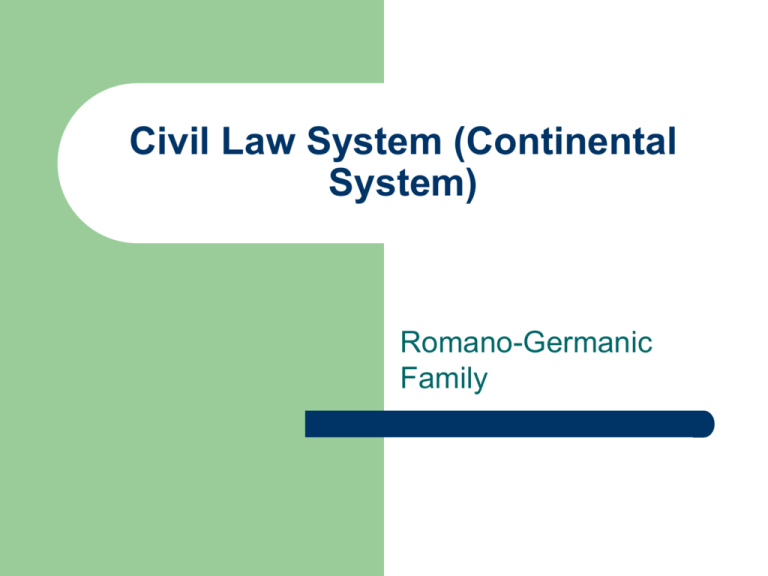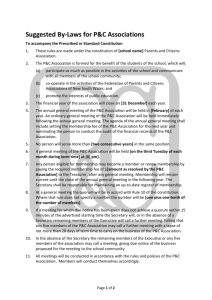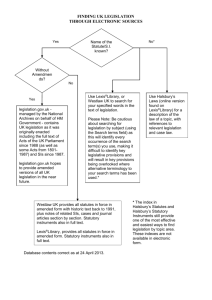Civil Law System (Continental System)
advertisement

Civil Law System (Continental System) Romano-Germanic Family Continental System Rules of Civil Law System were formulated basically by the legal scholars in universities not interested in the administration and application of these rules----these were vested to legal practitioners It has evolved basically as a private law occurred in the 13th Century, mostly because of the Renaissance + idea of secular society increase of the number of big cities and trade relations among them, rule of law or “legal system” became more important than before for the protection of “rule and order” in Europe Civil Law System collapse of the Roman Empire----the arbitrariness---a need to formulate a social relation based on law instead of arbitrariness Universities played an important role and the University of Bologna in Italy was at the top of this list Academics---the principles of justice and methods (ways) of finding out these principles Civil Law System They were not interested in the solutions by courts to pending cases They did not teach the local law, because it was primitive and it contained confusing elements. The law was related with the philosophy, theology and religion during this period. For them---Contrary to the Local law—Roman Law could offer an organized and clear understandable system Day by day the Roman Law was simplified + adapted and applied for the solution of new problems Civil Law System Roman Law was used as a basis for the creation of Romano-Germanic System Academic scholars adapted these Roman Laws to the society of their own time Romano-Germanic System has contributed to the unification of Europe but on the other hand it respected the diversity of European countries Civil Law System In the 17th and 18th Century---A new approach within the Civil Law System Occurred and called as “Natural Law School”: Contributions: – – order of a system is not because of a divine will (like god or king), but because of the human being itself----“man” in the middle and the “man’s reason” was accepted as the most important element for the creation of a legal system (secular) a different method in the application and interpretation of Roman Law-----there has to be public law in addition to the private law for the Roman Law---this public law was established by way of supporting the “natural rights of man” approach and by enhancing freedom and liberties of individual Civil Law System Another contribution was Codification. – – – – Codification means the collection and harmonization of rules and transforming them into a written form as “codes” mostly by way of enacting legislation through the legislative bodies At the end of the codification process-----“National legal systems” of different European countries. In 19th Century----different “Civil Codes” in Germany + France + and Switzerland. these codes were adapted to the changing needs of societies in which they were applied Civil Law System Because of the same techniques and methods derived from the original Roman Law----we can find; – – similar fundamental branches in European Countries they use same vocabulary and ideas Sources of Civil Law System These are the countries of written law---therefore “legislation” forms the basic source of law Sources: – – – – – 1- Legislation (Primary source) 2- custom 3- court decisions 4- doctrinal or legal writing 5-General principles of law Sources of Civil Law System Legislation: Constitution International Treaties Codes and Enacted Laws Statutes Statutory Decrees Regulations By-laws Sources of Civil Law System Rules and principles on Legislation: – – – Can be understood easily than other sources—written + explicit + general====”ignorance of law is no excuse” Includes more than one source and there is a hierarchy between these sub-branches of legislation Constitution is at the top of this hierarchy----All other ordinary legislation must be consistent with the Constitution-----result: “judicial control of constitutionality of ordinary legislation” in these countries. Sources of Civil Law System “international treaties”-----undertakings of state----are transformed into domestic legal system--------than become part of the legislation codes and enacted laws (or statutes) Sources enacted by executive organs instead of legislative one.-----they are called as “regulatory acts”: – – – They are promulgated for the implementation of statutes by administrative authorities They are subordinate to the legal statutes They are: Statutory decrees + regulations + by-laws Sources of Civil Law Systems Constitution: – – – Supreme law of the land---no law can be contrary to it Art. 11 Turkish Constitution: “Supremacy and Binding Force of the Constitution “The provisions of the Constitution are fundamental legal rules binding upon legislative, executive and judicial organs, and administrative authorities and other institutions and individuals. Laws shall not be in conflict with the Constitution” Sources of Civil Law Systems Codes and Statutes (Laws) – Different laws have different sphere of application – Some applies to entire territory and all citizens/residents (Criminal code) Some applies to only some citizens (Labor law or laws on particular areas--cities) Some applies for a certain amount of time: earthquake— tax exemptions Sometimes a law applies to a certain citizen: surname “Atatürk” Procedure for a law to be “put into force” Sources of Civil Law Systems International Treaties-(Uluslararası Antlaşmalar) – – – Treaties of which that state is party to... are approved by the Turkish Grand National Assembly by enactment of a law.-----therefore----technically treaties are Laws and like other Laws become enforceable following their publication in the Official Gazette But----the constitutionality of treaties in Turkey---unlike other statutes (Laws) Cannot be challenge.-----this is provided in the famous article 90 Art. 90 (Turkish Constitution) International Treaties ratified by the Grand National Assembly enjoy all the qualities of a law.----International agreements carry the force of law in Turkey----Be aware that this is valid for Turkey. But unlike lawsConstitutionality or unconstitutionality of international treaties cannot be detected (controlled) by the Constitutional Court. Their place in the hierarchy and Lisbon Treaty— Czech Constitutional Court Statutory Decrees (Kanun Hükmünde Kararnameler) Turkish Grand National Assembly can authorize the Council of Ministers by a special law to issue statutory decrees on certain topics. They are the decrees having the effect/force of law. Although statutory decrees are enacted by the executive authority, instead of the legislative one, they are submitted to the Parliament for the review and approval. This special law-----describes scope + principles and duration of the power to issue a statutory decrees. Statutory decree subject to judicial control of the constitutional court.-----They have to be consistent with the constitution + with codes and statutes + and with this special law. In Turkey in case of emergency and martial law-Council of Ministers has power to issue statutory decrees without an authorization from the Parliament.----Constitutionality of this kind of statutory decrees cannot be controlled and annulled by the Constitutional Court. Regulations (Tüzükler) The Council of Ministers has the power to issue regulations in order to determine and regulate the implementation of statutes. to issue a regulation-----there has to be a clear reference within the statute on the promulgation of regulations. Exp: TRNC Const. Art. 122: “Unless the Constitution or a law gives express power, no organ of the State shall make regulations and put them into force. By-laws shall be made and put into force only in accordance with Regulations.” Regulations Regulations contain more concrete and specific rules than statutes (Laws) In Turkey---You can get annulment of a regulation if it contains provisions contrary to statutes from the Council of State (Danıştay)---highest administrative court In TRNC---High Court (sitting as Administrative Court) By-laws (Yönetmelikler) According to Turkish Constitution prime Ministry + the ministries + and public corporate bodies (kamu tüzel kişileri) have the right to issue by-laws in order to ensure the enforcement of statutes and regulations they should be published in the official gazette Universities and municipalities may also issue bylaws in order to regulate their internal business and relations with individuals – Exp: by-laws on grading and evaluation + attendance By-laws By-laws must be compatible with the statutes and regulations. In Turkey---if a by-law is issued by a ministry and applied throughout the country-----the Council of State is the body which has power to declare bylaws as “null” if it is contrary to the statute or regulation. But by-laws issued by other corporate bodies--not applied throughout the country might be invalidated by lower administrative courts (Ankara University----Promotion academics) Custom (Gelenek)---Second source of Law in Civil Law Countries In the primitive communities---customary rules played an important role---But development of legislators in world—in the modern communities In Turkish legal system for a custom to have legal validity----there are some requirements that must be satisfied: – – – – – Antiquity Continuity Popular belief in the rightness of a custom State sanction Agreement with statutory law Conditions of Custom Continuity: This is the “objective (material) factor” for the validity of a custom. A customary rule must be continuously observedIf it is abandoned or its practice is interrupted in favor of another custom--the continuity requirement is not fulfilled antiquity: As a principle----a customary rule must have existed for a long time and no living person should know the beginning of it – Exceptions---recently existed custom due to new inventions---custom on space law Conditions of Custom Popular belief in the rightness of a custom: This is the “subjective factorelement” for the validity of a custom. A customary rule must consciously or unconsciously be considered “right” by the members of the society---– – This is called “opinio juris” in Roman law If a custom is maintained only by force---it cannot be considered as valid custom. Conditions of Custom State sanction: A customary rule receives legal recognition when it is enforced by court order.----But a statute is law even before it is enforced by a court decision (remember classical theory in English Legal System) – – – When does a court apply customary law rules? civil code says: “where no provisions are applicable, the judge should decide according to existing customary law…” When the statutes are silent-----judges are allowed to apply customary principles Conditions of Custom Agreement with statutory law: A valid custom must be in agreement with statutory laws statutory laws are superior to the customary rules. polygamy (having more than one spouse at the same time) was abolished in Turkey by lawreligious custom became “null and void” Other Sources in Civil Law Systems Court Decisions—Jurisprudence (Mahkeme kararları-İctihad)-third source of Law in Civil Law Countries: – – – judges tend to decide in accordance with the pattern of previously decided cases: easy + safe Contrary to Common Law system---in the Continental countries judicial precedents are not regarded as direct source of law court decisions play a creative part in the process of interpretation of legislative texts only. And court decisions do not directly create legal rules Court decisions In Turkey----only certain precedents are followed.------inferior civil and criminal courts are bound by some decisions of the Court of Cassation (Yargıtay) and this court is also bound by some of its own decisions. Again---inferior administrative courts are bound by some decisions of the Council of State (Danıştay). – “some decisions”----Chambers responsible for “unified decisions” of superior courts binding and authoritative decisions of higher courts in Turkey are-----Court of Cassation + Council of State + Military Court of Cassation + High Military Administrative Court (Yüksek Askeri İdare Mahkemesi) Legal Writing-Doctrine position of universities within the evolution of the Romano-Germanic Family With the codification----this primacy of doctrinal writing was replaced by the enacted law legal writings are often persuasive and used as a supportive element of a certain decision of the courts offers some amendments and additions to the legal rules currently in force and they contribute to the dynamic evolution of law. Doctrine also creates some guidelines for the authorities administering the law 2001 Turkish Civil Code: (Art. 1): “Law applies to all matters with its letter and spirit. If there is no provision in the law applicable to a case, the judge decides in accordance with custom. The judge take into consideration academic opinions and court decisions in taking his/her decision” General Principles of Law Examples: – – “Principle of good faith” (bona fide principle): if you misuse your right it would be impossible for you to exercise it again in future “the principle of non-retroactivity of laws”: a statute could not change rules applicable to past events.------and it is very important for the stability of law and legal order a safeguard of democracy and personal freedom Article 38 of the Turkish Constitution provides that “No one shall be punished for any act which does not constitute a criminal offence under the law in force at the time committed; no one shall be given a heavier penalty for an offence other than the penalty applicable at the time when the offence was committed.” Exception----reduction case-in favor of the offender General Principles of Law – – – – – “Ignorance of law is no excuse”: Lex posterior Lex specialis Presumption of innocence No need to see such principles in a written form in laws or other forms of legislation






